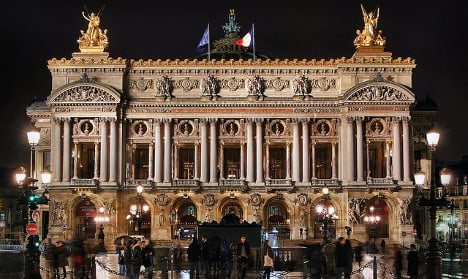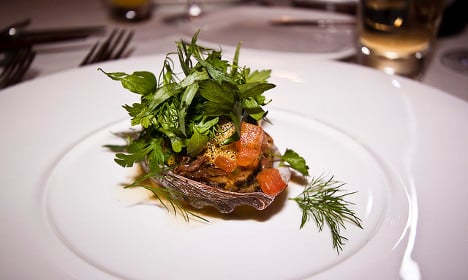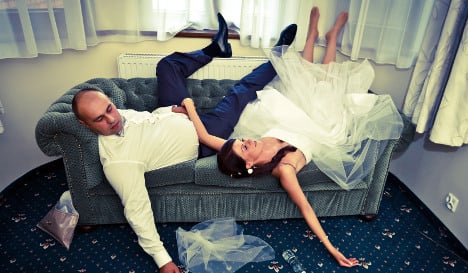The nine causes of Anglo-French wedding blues

The culture clash between Anglos and French is never greater than when it comes to weddings. The Local's Ben McPartland examines why his attempts to organise his own cross-Channel marriage keep breaking down.
1. Location, Location, Location

(Photo: R~P~M/Flickr)
First question is obviously where to have the wedding. This is kind of made easier by the fact that English wedding guests are a bit like English football fans in that they love to travel to a match. It’s mainly due to the fact they like nothing more than boozing on the move. The French, just like their national team’s supporters, are unlikely to travel in such big numbers. This makes France the obvious host country for the wedding, especially given the range of spectacular, if pricey range of places available to tie the knot. Problem rating: Low. Solution: Get married near an airport or a port.
2. The paper work

(Photo: Shutterstock)
Once you’ve chosen to have the wedding in France, the feelings of regret start to build. Firstly, think about the level of paperwork that is needed. In the UK normally a couple of passports will suffice to get you registered for the ceremony, but in France you’ll need to employ a personal assistant to do all the paperwork. Birth certificates need to be officially translated, then there’s proofs of address, and something known as a “certificate de coutume”, from a lawyer saying you are legally free to get married. Basically you need every bit of official paper you have ever collected, including your 10m swimming certificate. Problem rating: Medium. Solution: Just get on with it.
3. The Service

(Photo: Xynn Tii/Flickr)
But then there’s the problem of having to get married at a French Town Hall. In the UK the registrar will pretty much travel to any venue you like, pubs included, but in France the mayors who carry out the marriages refuse to budge. The services are about as romantic and emotional as if someone just read pages out of the phone book. Half the guests don’t even bother going. You often only get a slot in the morning, which means everyone then disappears again until the evening, so the atmosphere deflates. The split day has knock-on effects on transport logisitcs too. Problem rating: medium. Solution: Make the mayor watch Titanic before the service.
4. The meal

(Photo: Ben Camp/Flickr)
In the UK the meal at a wedding is just a distraction. You could give most people a plate of chips and they’d be happy, as long as there’s plenty of plonk. In France of course, much more importance is given to the meal. Which means it’s often pricier. But is there any point spending €50 a head on a five-course meal when half the guests don’t really care? Then again, you can’t be serving up food for your French guests that they can get in your average brasserie. Problem rating: medium. Solution: Pay up and give the Anglo guests a decent meal.
5. Speeches

(Photo: Ron/Flickr)
In the UK, the best man’s speech is more important than the wedding vows. It’s the moment everyone waits for and the wedding can hinge on whether the speech is any good. In France there’s no one key moment, with different groups of friends doing everything from polished video sketches to power point presentations and sing songs. The quality varies dramatically, and they can extend the meal time by hours. Obviously the key point here is not just a difference in tradition but language too. Do we employ someone as an interpreter or do the speeches in both languages? Problem rating: Very High. Solution: Get the UN to send some of those headphones along with interpreters.
6. Bacon Butties

(Photo: CandySchwarz/Flickr)
Imagine the look on the in-laws faces when you mention the need for bacon butties to be provided at around 10pm. Even after a five-course meal of the finest French cuisine, there’ll be a small group of Anglos, chanting for bacon butties come midnight. Problem rating: low. Solution: Make a few in advance and ask the servers to put them in the microwave.
7. The booze

(Photo: Shutterstock)
The French would be shocked to have to pay for any kind of alcoholic drink at a wedding. Whereas if there was a free bar at an English wedding all night, most newly-wed couples would have to do a runner on their wedding night and leave the country. Free wine for the meal is generally a given, but then what about after? How do we quench the thirst of the Anglo guests without becoming bankrupt and make sure the French don’t have to bring their wallets? Problem rating: medium. Solution: Allow people to bring their own booze.
8. The booziness

(Photo: Shutterstock)
The contrast in the levels of drunken debauchery between the Anglo and French guests is enough to give you nightmares. At one of the last weddings I went to I was hit square on in the face by a potato in the middle of a drunken food fight. The thought of my mother-in-law getting struck by a piece of flying foie gras thrown by a drunk mate, who was actually aiming for my partner, keeps me up at night. And would the French guests join in a "pile on"? Problem rating: Extremely high. Solution: Don't get married
9. The disco

(Photo: Thomas Hawk/Flickr)
This is probably the biggest issue when it comes to organising an Anglo French wedding. What to do about the music? Music at French weddings tends to be just cheesy pop from the eighties that everyone, I mean everyone, knows all the words to. Imagine the Anglos surrounding the dancefloor arms folded ready to invade or storming the DJ box and sacking the disc jockey. Although the French will have a better knowledge of Anglo music, we can’t expect them to rock to the full back catalogue of Oasis all night. Problem rating: very high. Solution: One song each.
Comments
See Also
1. Location, Location, Location

(Photo: R~P~M/Flickr)
First question is obviously where to have the wedding. This is kind of made easier by the fact that English wedding guests are a bit like English football fans in that they love to travel to a match. It’s mainly due to the fact they like nothing more than boozing on the move. The French, just like their national team’s supporters, are unlikely to travel in such big numbers. This makes France the obvious host country for the wedding, especially given the range of spectacular, if pricey range of places available to tie the knot. Problem rating: Low. Solution: Get married near an airport or a port.
2. The paper work

(Photo: Shutterstock)
Once you’ve chosen to have the wedding in France, the feelings of regret start to build. Firstly, think about the level of paperwork that is needed. In the UK normally a couple of passports will suffice to get you registered for the ceremony, but in France you’ll need to employ a personal assistant to do all the paperwork. Birth certificates need to be officially translated, then there’s proofs of address, and something known as a “certificate de coutume”, from a lawyer saying you are legally free to get married. Basically you need every bit of official paper you have ever collected, including your 10m swimming certificate. Problem rating: Medium. Solution: Just get on with it.
3. The Service

(Photo: Xynn Tii/Flickr)
But then there’s the problem of having to get married at a French Town Hall. In the UK the registrar will pretty much travel to any venue you like, pubs included, but in France the mayors who carry out the marriages refuse to budge. The services are about as romantic and emotional as if someone just read pages out of the phone book. Half the guests don’t even bother going. You often only get a slot in the morning, which means everyone then disappears again until the evening, so the atmosphere deflates. The split day has knock-on effects on transport logisitcs too. Problem rating: medium. Solution: Make the mayor watch Titanic before the service.
4. The meal

(Photo: Ben Camp/Flickr)
In the UK the meal at a wedding is just a distraction. You could give most people a plate of chips and they’d be happy, as long as there’s plenty of plonk. In France of course, much more importance is given to the meal. Which means it’s often pricier. But is there any point spending €50 a head on a five-course meal when half the guests don’t really care? Then again, you can’t be serving up food for your French guests that they can get in your average brasserie. Problem rating: medium. Solution: Pay up and give the Anglo guests a decent meal.
5. Speeches

(Photo: Ron/Flickr)
In the UK, the best man’s speech is more important than the wedding vows. It’s the moment everyone waits for and the wedding can hinge on whether the speech is any good. In France there’s no one key moment, with different groups of friends doing everything from polished video sketches to power point presentations and sing songs. The quality varies dramatically, and they can extend the meal time by hours. Obviously the key point here is not just a difference in tradition but language too. Do we employ someone as an interpreter or do the speeches in both languages? Problem rating: Very High. Solution: Get the UN to send some of those headphones along with interpreters.
6. Bacon Butties

(Photo: CandySchwarz/Flickr)
Imagine the look on the in-laws faces when you mention the need for bacon butties to be provided at around 10pm. Even after a five-course meal of the finest French cuisine, there’ll be a small group of Anglos, chanting for bacon butties come midnight. Problem rating: low. Solution: Make a few in advance and ask the servers to put them in the microwave.
7. The booze

(Photo: Shutterstock)
The French would be shocked to have to pay for any kind of alcoholic drink at a wedding. Whereas if there was a free bar at an English wedding all night, most newly-wed couples would have to do a runner on their wedding night and leave the country. Free wine for the meal is generally a given, but then what about after? How do we quench the thirst of the Anglo guests without becoming bankrupt and make sure the French don’t have to bring their wallets? Problem rating: medium. Solution: Allow people to bring their own booze.
8. The booziness

(Photo: Shutterstock)
The contrast in the levels of drunken debauchery between the Anglo and French guests is enough to give you nightmares. At one of the last weddings I went to I was hit square on in the face by a potato in the middle of a drunken food fight. The thought of my mother-in-law getting struck by a piece of flying foie gras thrown by a drunk mate, who was actually aiming for my partner, keeps me up at night. And would the French guests join in a "pile on"? Problem rating: Extremely high. Solution: Don't get married
9. The disco

(Photo: Thomas Hawk/Flickr)
This is probably the biggest issue when it comes to organising an Anglo French wedding. What to do about the music? Music at French weddings tends to be just cheesy pop from the eighties that everyone, I mean everyone, knows all the words to. Imagine the Anglos surrounding the dancefloor arms folded ready to invade or storming the DJ box and sacking the disc jockey. Although the French will have a better knowledge of Anglo music, we can’t expect them to rock to the full back catalogue of Oasis all night. Problem rating: very high. Solution: One song each.
Join the conversation in our comments section below. Share your own views and experience and if you have a question or suggestion for our journalists then email us at [email protected].
Please keep comments civil, constructive and on topic – and make sure to read our terms of use before getting involved.
Please log in here to leave a comment.